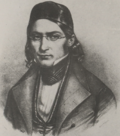Reform Judaism
Progressive Judaism, sometimes called Reform Judaism is a change of beliefs within Judaism. This change began in 19th century Germany. There are a number of changes which fall under these denominations. In very basic terms:
- Jewish laws can be split into two laws: ethical and ritual laws. The ethical laws do not change, the ritual laws can be changed.
- As good as Jews can, they should try to be like the country they live in. This means that some of the ritual laws must be changed. The changes also allow modern lifestyles.
- The religious books of Judaism should not be read exactly as they are written. They can be read, thought about and challenged like any other text.
- Women are seen as the same as men and are allowed to sit with the men when in the synagogue while in Orthodox Judaism, women are expected to sit in a different place. Women are also allowed to not wear head coverings when attending synagogue.
- Hebrew is not always spoken in Reform synagogues.
Reform Judaism Media
The interior of the Temple Emanu-El of New York, the largest Reform synagogue in the world.
- Hamburg1818b.jpg
A segment of the 1818 Hamburg prayer book. Stating "accept the uttering of our lips instead of our obligatory sacrifices" and omitting the traditional "O gather our dispersions... Conduct us unto Zion" passage.
Rabbi Abraham Geiger, circa 1840.
Rabbi Samuel Holdheim, circa 1850.
Rabbi David Einhorn.
Rabbi Kaufmann Kohler.
Portrait of Claude Montefiore (1858-1938)
Contemporary Reform service held in Sinai Synagogue, with some congregants wearing head coverings and prayer shawls.
Related pages
- Orthodox Judaism - the old type of Judaism
- Conservative Judaism






